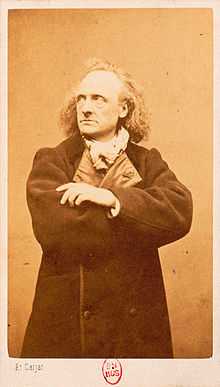Henry Litolff
| Henry Charles Litolff | |
|---|---|
 Henry Litolff | |
| Background information | |
| Genres | Classical music |
| Occupations | Pianist |
| Instruments | Piano |
Henry Charles Litolff (5 February 1818[1] – 5 or 6 August 1891) was a piano virtuoso, composer of Romantic music and music publisher. He became a prolific composer, although he is now known mainly as the founder of the Litolff Edition of classical and modern music. He died at Bois-Colombes near Paris.
Biography
Litolff was born in London, the son of a Scottish mother and an Alsatian father. His father was a violinist who had been taken to London as a prisoner after being captured while fighting for Napoléon in the Peninsular War.
He began his musical education under his father, but in 1830, when he was twelve he played for renowned virtuoso pianist Ignaz Moscheles, who was so impressed that he gave him free lessons starting that same year. Litolff began to give concerts when he was fourteen. His lessons with Moscheles continued until Litolff eloped in 1835, at the age of 17, to Gretna Green, to marry 16-year-old Elisabeth Etherington. The couple moved to Melun, and then to Paris.
He separated from Elisabeth in 1839 and moved to Brussels,[2] and around 1841 moved to Warsaw where he is believed to have conducted the Teatr Narodowy (National Theatre) orchestra. In 1844 he travelled to Germany, gave concerts and taught future great pianist-conductor Hans von Bülow.[3] The following year, he returned to England with the idea of finally divorcing Elisabeth; but the plan backfired and he ended up not only heavily fined but imprisoned. He managed to escape and flee to the Netherlands, however.[n 1] He became friends with music publisher Gottfried Meyer and, after Meyer's death, married his widow Julie in 1851 (after finally being granted a divorce from Elisabeth as a new citizen of Brunswick). This second marriage lasted until 1858, when he divorced her and once again moved to Paris.
Works
His most notable works were the five concertos symphoniques, essentially symphonies with piano obbligato. The first one, in D minor, is lost; the others (which, though not regularly heard in the concert repertoire, are all available in modern recordings) are:
- Concerto Symphonique No. 2 in B minor, Op. 22 (1844)
- Concerto Symphonique No. 3 in E-flat, Op. 45 (c. 1846)
- Concerto Symphonique No. 4 in D minor, Op. 102 (c. 1852)
- Concerto Symphonique No. 5 in C minor, Op. 123 (c. 1867)
The only one of Litolff's compositions still performed at all regularly is the somewhat Mendelssohnian scherzo from the Fourth Concerto Symphonique, although his music was admired by Franz Liszt and he was the dedicatee of Liszt's own First Piano Concerto.
Litolff's Drame symphonique No. 1 Maximilien Robespierre, Op. 55, was one of the works conducted on Christmas Eve 1925 by Yuri Fayer at the Bolshoi Theatre in Moscow to accompany the world's first showing of Sergei Eisenstein's film Battleship Potemkin.[4]
Gallery
-

Henry Charles Litolff's tomb in Bois de Colombes.
Sources
- Blair, Ted M., Cooper, Thomas: 'Litolff, Henry (Charles)' in Grove Music Online ed. L. Macy
Notes
- ↑ Escape said to be with the assistance of the gaoler's daughter.
References
- ↑ Grove's Encyclopaedia of Music gives the birth date as 7 August 1818
- ↑ British periodicals in the creative arts (1855). The Musical world, Vol. 33. London: J. Alfredo Novello. p. 6.
- ↑ Dana Andrew Gooley, Christopher Howard Gibbs (2006). Franz Liszt and his world. Princeton University Press. p. 414. ISBN 0-691-12902-9.
- ↑ Kennedy Centre
External links
| Wikimedia Commons has media related to Henry Litolff. |
- Free scores by Henry Charles Litolff at the International Music Score Library Project
- Henry Litolff Piano Trio No.1 in d minor, Op.47 Soundbites and discussion of work
- "Happy Birthday, Litolff (Who?)" — by Jeffrey Engel for The Voice News
- Henry Charles Litolff — Hyperion's composer page
- Philippe Entremont plays the Scherzo from Concerto Symphonique No 4. Op. 102 (with 2-piano score cued to the music)
|